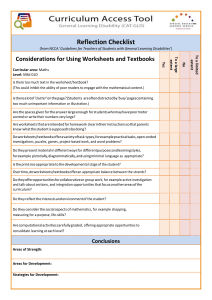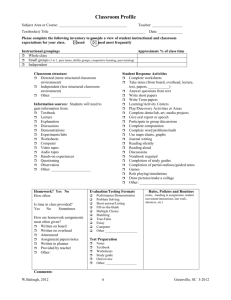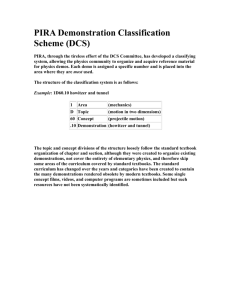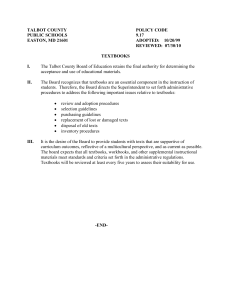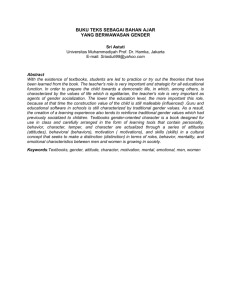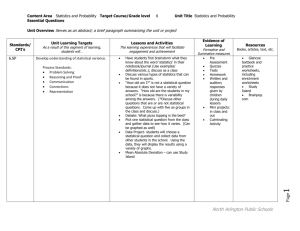Unit 2 Science newsletter
advertisement
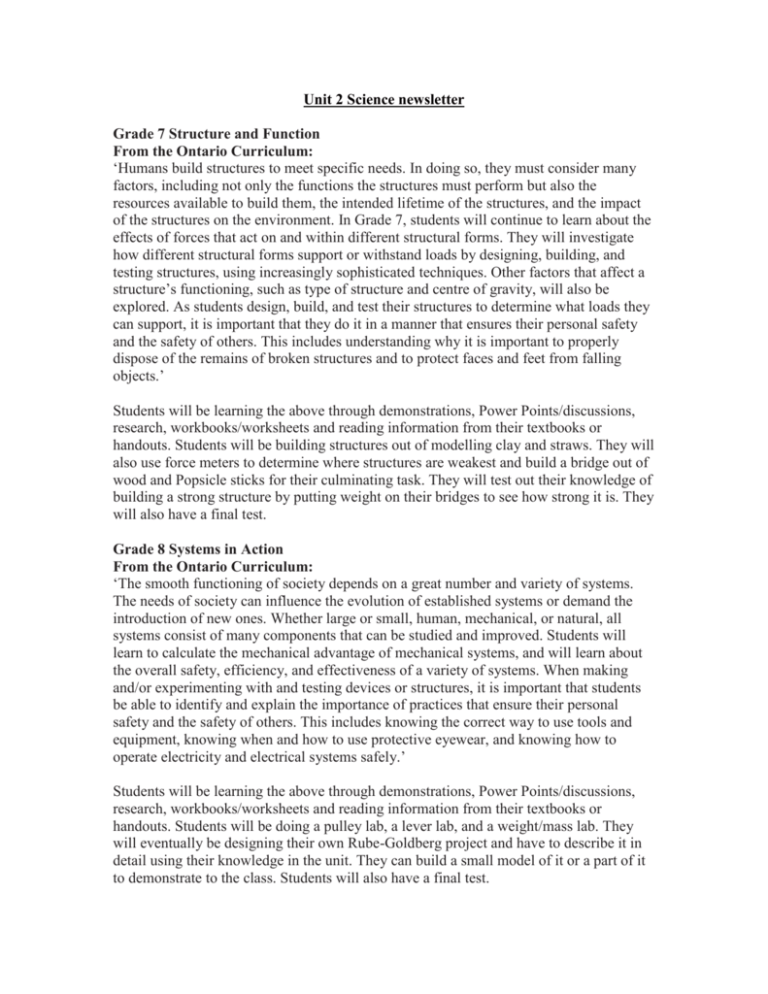
Unit 2 Science newsletter Grade 7 Structure and Function From the Ontario Curriculum: ‘Humans build structures to meet specific needs. In doing so, they must consider many factors, including not only the functions the structures must perform but also the resources available to build them, the intended lifetime of the structures, and the impact of the structures on the environment. In Grade 7, students will continue to learn about the effects of forces that act on and within different structural forms. They will investigate how different structural forms support or withstand loads by designing, building, and testing structures, using increasingly sophisticated techniques. Other factors that affect a structure’s functioning, such as type of structure and centre of gravity, will also be explored. As students design, build, and test their structures to determine what loads they can support, it is important that they do it in a manner that ensures their personal safety and the safety of others. This includes understanding why it is important to properly dispose of the remains of broken structures and to protect faces and feet from falling objects.’ Students will be learning the above through demonstrations, Power Points/discussions, research, workbooks/worksheets and reading information from their textbooks or handouts. Students will be building structures out of modelling clay and straws. They will also use force meters to determine where structures are weakest and build a bridge out of wood and Popsicle sticks for their culminating task. They will test out their knowledge of building a strong structure by putting weight on their bridges to see how strong it is. They will also have a final test. Grade 8 Systems in Action From the Ontario Curriculum: ‘The smooth functioning of society depends on a great number and variety of systems. The needs of society can influence the evolution of established systems or demand the introduction of new ones. Whether large or small, human, mechanical, or natural, all systems consist of many components that can be studied and improved. Students will learn to calculate the mechanical advantage of mechanical systems, and will learn about the overall safety, efficiency, and effectiveness of a variety of systems. When making and/or experimenting with and testing devices or structures, it is important that students be able to identify and explain the importance of practices that ensure their personal safety and the safety of others. This includes knowing the correct way to use tools and equipment, knowing when and how to use protective eyewear, and knowing how to operate electricity and electrical systems safely.’ Students will be learning the above through demonstrations, Power Points/discussions, research, workbooks/worksheets and reading information from their textbooks or handouts. Students will be doing a pulley lab, a lever lab, and a weight/mass lab. They will eventually be designing their own Rube-Goldberg project and have to describe it in detail using their knowledge in the unit. They can build a small model of it or a part of it to demonstrate to the class. Students will also have a final test. Unit 3 Science Newsletter Grade 7 Pure substances and mixtures From the Ontario Curriculum: ‘By exploring the distinction between pure substances and mechanical mixtures and solutions, students will come to recognize that most matter is either a solution or a mechanical mixture – including most foods and drinks and many medicines, cosmetics, building materials, and cleaning agents. Students will use this information to weigh the social and environmental consequences of the use of various consumer products. The introduction of a scientific model (the particle theory) to describe the particulate nature of matter will provide students with a conceptual basis for learning in this area.’ Students will be learning the above through demonstrations, Power Points/discussions, research, workbooks/worksheets and reading information from their textbooks or handouts. In this unit, students will be shown different solutions and understand their different components through various demonstrations. Students will do 2 different separation labs and also a lab write-up based on a distillation experiment demonstration. They have a project based on separation techniques and a final test. Grade 8 Fluids From the Ontario Curriculum: ‘Fluids are essential to many industrial processes and form the basis of hydraulic and pneumatic devices. Any substance that flows is considered to be a fluid. This includes such things as water, shampoo, sunscreen, and honey. Even gases, such as air, can be classified as fluids. Students will learn about the diverse applications of the principles involved in fluid mechanics, the impacts of technological innovations based on the properties of fluids, and the industries and jobs related to fluids. To learn about the properties of fluids, students will experiment with and investigate the viscosity and density of different liquids and ways in which these properties affect objects placed in those liquids. Students will explore the implications of Archimedes’ principle by investigating and measuring the buoyant forces on different objects.’ Students will be learning the above through demonstrations, Power Points/discussions, research, workbooks/worksheets and reading information from their textbooks or handouts. Students will be testing viscosity of different fluids and also how temperature affects viscosity, as well as a density lab. They will be looking at different syringes and how their size plays a role in their function. Toward the end of the unit, students will be building their own hydraulic device as a culminating task. They will also have a final test. Grade 7 Heat in the Environment From the Ontario Curriculum: ‘Heat energy plays a critical role in natural processes and in human life. Global warming has also focused considerable attention on the processes that control temperatures at the earth’s surface. By acquiring a working understanding of the nature of heat, students in Grade 7 will gain new insights into the ways that heat affects our world. Students will learn about the causes and effects of heat, investigate its properties, relate it to geological and meteorological processes, and use their new-found knowledge to design a device to minimize heat transfer. They will also use the particle theory to help them explain their observations.’ Students will be learning the above through demonstrations, Power Points/discussions, research, workbooks/worksheets and reading information from their textbooks or handouts. Students will be doing a hands-on lab where they have to measure and graph ice melting and water boiling (explaining the plateau effect). They also have a project on global warming and a final test. Grade 8 Water Systems From the Ontario Curriculum: ‘More than 70 per cent of the earth’s surface is covered with water, and most of this water is found in the oceans. In learning about the earth’s water systems, students will develop an understanding of the important role that water systems play in global ecosystems. They will evaluate the role media play in portraying controversial water issues and research recent technological innovations related to Earth’s water systems. Students will gain a basic understanding of Earth’s water systems and come to a better understanding of their own role in caring for this precious resource.’ Students will be learning the above through demonstrations, Power Points/discussions, research, workbooks/worksheets and reading information from their textbooks or handouts. They will be doing a simulated lab on water pollution and a project on oceans and different scientists. Students will also be doing a water conservation project and will have a final test.
